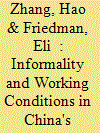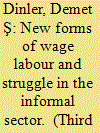| Srl | Item |
| 1 |
ID:
166872


|
|
|
|
|
| Summary/Abstract |
Drawing on ethnographic data from the sanitation industry in Wenzhou and Guangzhou, we investigate different patterns of work organization in each city. We find that supplementary informal work can serve to subsidize low family income and therefore stabilize formal but exploitative work. In Wenzhou, the family team model creates time and space for one spouse to engage in informal work while still receiving a wage from the employer. This additional informal work significantly increases net family income, which neutralizes worker demands for better wages and working conditions in the formal sector. In contrast, Guangzhou workers are subject to relatively rigid spatio-temporal controls, impeding them from participating in informal work to supplement their formal wages. Despite receiving higher wages and more benefits, these workers are highly wage dependent and express much greater discontent than their equivalents in Wenzhou. Theoretically, we contribute to the literature on informality through a discussion of “ancillary informal work,” highlighting how access to certain kinds of informal work both subsidizes and is facilitated by formal sector employment.
|
|
|
|
|
|
|
|
|
|
|
|
|
|
|
|
| 2 |
ID:
148272


|
|
|
|
|
| Summary/Abstract |
In the absence of formal employment opportunities and with increasing urban and rural poverty, the informal recycling sector has become a means of survival for the past two decades in Turkey. In the capital city, Ankara, the large majority of waste pickers constitute former dispossessed Kurdish farmers who migrated to the city with their families from the southeastern regions as a result of forced migration, and seasonal Kurdish workers who alternate between rural and urban employment. The introduction of new waste management regulations in 2004 made the recycling market a significant area of struggle between local authorities, recycling companies and waste pickers. Local authorities have used these regulations to force waste pickers to sell their waste to certain recycling companies at a price lower than the market price. Waste pickers have reclaimed their right to work in the streets against the violence executed by the municipal police. This paper investigates the ways in which waste pickers should be considered wage labourers and what kind of a moral discourse they have used in making their demands vis-à-vis local governments during the process of intense conflict and negotiation.
|
|
|
|
|
|
|
|
|
|
|
|
|
|
|
|
| 3 |
ID:
174844


|
|
|
|
|
| Summary/Abstract |
Many developing countries have large populations at risk of falling into chronic poverty due to threats to their health and livelihoods. Despite global poverty reduction over recent decades, many remain near-poor, and an episode of ill health or job loss can plunge a household into poverty. The coronavirus pandemic threatens to send tens of millions of people around the world below the poverty line. Some countries are especially unprepared to protect their people from health and economic shocks. They should focus on reforms to improve access to health care, secure work, and opportunities for social mobility.
|
|
|
|
|
|
|
|
|
|
|
|
|
|
|
|